Table of Contents
Comparison of Gandhiji with Other Educationists:
Pestalozzi and Gandhiji:
(1) Education for All- Both Pestalozzi and Gandhiji laid emphasis on education for the masses (education for all).
(2) Harmonious Development- Both Pestalozzi and Gandhiji believed in the harmonious development of human personality. In the words of Pestalozzi education is natural, harmonious and progressive development of man’s innate powers. Gandhiji speaks of education as “all-round drawing out of the best in child and man-body, mind and spirit”.
(3) Teaching of Crafts- Both Pestalozzi and Gandhiji viewed agriculture and spinning and weaving as the main crafts which must be taught to the child. However, unlike Gandhiji, Pestalozzi did not emphasize much upon the correlation of craft with the teaching of other subjects.
(4) As Fathers’- If Pestalozzi was called “Father Pestalozzi” Gandhiji was called the “Father of Nation”.
John Dewey and Gandhiji:
(1) Pragmatists- Both John Dewey and Gandhiji were pragmatists and practical thinkers.
(2) Faith in Democracy- Both stood for the democratic order of society. They advocated love, equality and justice as principles of democracy.
(3) Learning by Doing and Experience- Both John Dewey and Gandhiji were great activists. They advocated learning by doing and learning by experience and not listening and talking in education. Activity, expression and construction were the fundamental principles of their teaching and methods.
(4) School and Society- Both believed in relating the school with society. Both advocated that children should learn in cooperative community and social experience.
(5) Education through Crafts- Both advocated intellectual education through crafts and occupation. Both the educationists believed in self-supporting education.
Rousseau and Gandhiji:
Both Rousseau and Gandhiji have many common features of educational philosophy.
(1) Child-Centred Education- Both Rousseau and Gandhiji emphasized child-centred education. Both of them gave an important place to the child in the scheme of education. They believed in the development of a child’s inner faculties and powers. They were great lovers of children.
(2) Nature of the Child- Like Rousseau Gandhiji starts with the basic assumption that the child is good by nature. The teacher should keep this vital fact in mind while planning his education.
(3) Freedom for the Child- Both Rousseau and Gandhiji advocated freedom for the child. Both believed that there should not be unnecessary restrictions on the timetable or the syllabus as are found in the traditional schools. Moreover, the atmosphere should be as free as possible. Children should be educated in an atmosphere of freedom.
(4) Against Traditional Education-Both protested against all traditional education which has made all of us unfit for everything. In the words of Gandhiji, “I am convinced that the present system of primary education is not only wasteful but positively harmful. Most of the boys are lost to the parents and to the occupation to which they are born”.
(5) Against Verbalism- Both of them were against verbalism and wanted the child to work with his own hand for the development of the mind. Like Rousseau, Gandhiji was against all existing textbooks (which are based upon foreign culture). He however did not minimize the importance of textbooks but believed that for a new pattern of education new types of books are necessary.
(6) Natural Surroundings- Both of them advocated that the child should be educated in natural surroundings, away from the restricted atmosphere of our conventional society. As we have stated earlier, Gandhiji expects the teachers to educate village children in their villages so as to draw out all their faculties through some selected handi-crafts.
It should be kept in mind that whereas Rousseau advocated negative education and wanted the child to learn by error, Gandhiji’s approach was positive and he wanted to make efforts that the child should not commit any error.
Unlike Rousseau, Gandhiji does not believe in discipline by natural consequences. He believes in self-discipline. The child must be conscious of the laws he obeys. He must be conscious of the value of rules of discipline. The place where our future citizens can be disciplined is the school.
Froebel and Gandhiji:
Both Froebel and Gandhiji have many common features of educational philosophy-
(1) All-round Development- Both Froebel and Gandhiji advocated all-around development of personality i.e., the development of body, mind and soul.
(2) Arousal of Innate Propensities- Froebel remarks that the innate propensities of the child must be aroused. They must not be allowed to lie dormant. Gandhiji also believes that the function of education is to arouse the natural powers to the best and the fullest development.
(3) Spiritual Union With God- Both believe that everything of human creation in this universe is the manifestation of the Almighty or the Ultimate Truth. God pervades in everything and that knowledge about Him is the ultimate aim of education. Froebel says that education must enable the child to understand the principle of unity and must enable him to have a spiritual union with God. Gandhiji states that self-realization or union with God is the ultimate aim of education. In his words, education should aim at the realization of the ultimate reality- the merger of the finite being into the infinite.
(4) Self Activity- Both Froebel and Gandhiji believe in the principle of self-activity. They assert that the real development of the child is possible only through self-activity or learning by doing. They find spiritual meaning behind every activity.
(5) Social Environment- Both Froebel and Gandhiji recognize the importance of the social environment. Real education can take place in the company of others because the life of an individual is an integral part of society. Hence children should be trained to lead a group life and to live well in society.
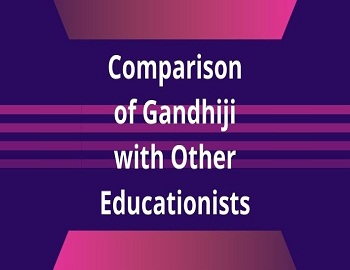
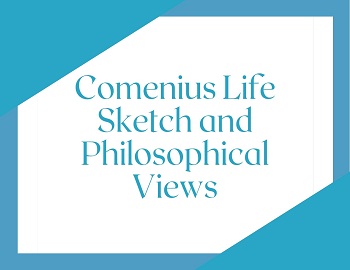
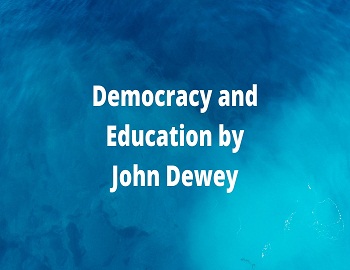
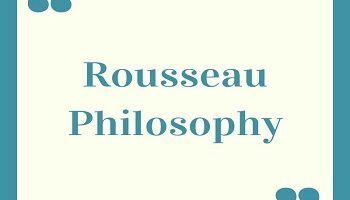


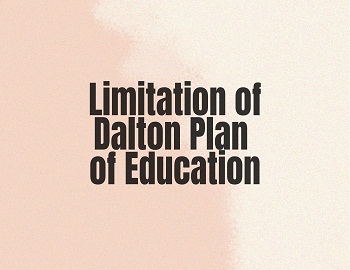

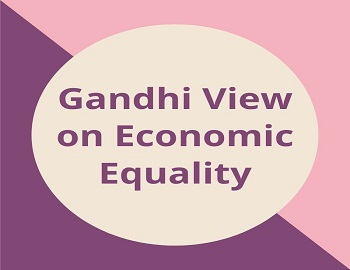
Comments (No)